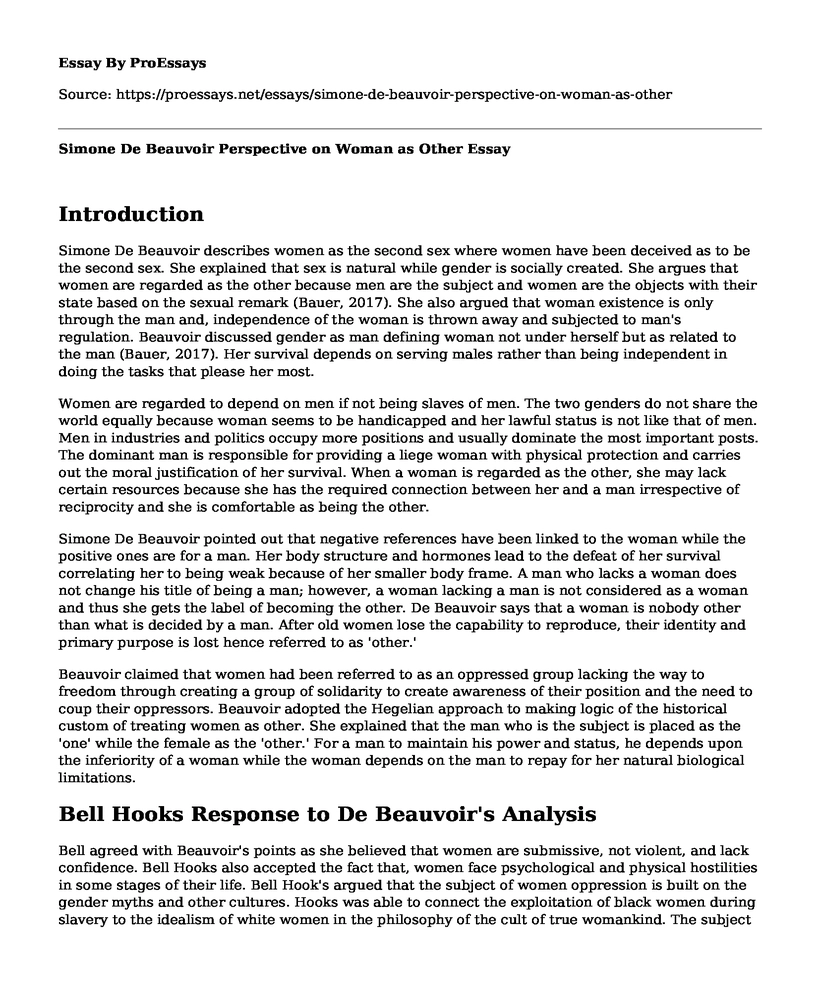Introduction
Simone De Beauvoir describes women as the second sex where women have been deceived as to be the second sex. She explained that sex is natural while gender is socially created. She argues that women are regarded as the other because men are the subject and women are the objects with their state based on the sexual remark (Bauer, 2017). She also argued that woman existence is only through the man and, independence of the woman is thrown away and subjected to man's regulation. Beauvoir discussed gender as man defining woman not under herself but as related to the man (Bauer, 2017). Her survival depends on serving males rather than being independent in doing the tasks that please her most.
Women are regarded to depend on men if not being slaves of men. The two genders do not share the world equally because woman seems to be handicapped and her lawful status is not like that of men. Men in industries and politics occupy more positions and usually dominate the most important posts. The dominant man is responsible for providing a liege woman with physical protection and carries out the moral justification of her survival. When a woman is regarded as the other, she may lack certain resources because she has the required connection between her and a man irrespective of reciprocity and she is comfortable as being the other.
Simone De Beauvoir pointed out that negative references have been linked to the woman while the positive ones are for a man. Her body structure and hormones lead to the defeat of her survival correlating her to being weak because of her smaller body frame. A man who lacks a woman does not change his title of being a man; however, a woman lacking a man is not considered as a woman and thus she gets the label of becoming the other. De Beauvoir says that a woman is nobody other than what is decided by a man. After old women lose the capability to reproduce, their identity and primary purpose is lost hence referred to as 'other.'
Beauvoir claimed that women had been referred to as an oppressed group lacking the way to freedom through creating a group of solidarity to create awareness of their position and the need to coup their oppressors. Beauvoir adopted the Hegelian approach to making logic of the historical custom of treating women as other. She explained that the man who is the subject is placed as the 'one' while the female as the 'other.' For a man to maintain his power and status, he depends upon the inferiority of a woman while the woman depends on the man to repay for her natural biological limitations.
Bell Hooks Response to De Beauvoir's Analysis
Bell agreed with Beauvoir's points as she believed that women are submissive, not violent, and lack confidence. Bell Hooks also accepted the fact that, women face psychological and physical hostilities in some stages of their life. Bell Hook's argued that the subject of women oppression is built on the gender myths and other cultures. Hooks was able to connect the exploitation of black women during slavery to the idealism of white women in the philosophy of the cult of true womankind. The subject of oppression has a changed perspective if a race is a factor because race itself is oppression. When the race is a crucial element, there is a massive change in women perception in the society. Hooks critiqued that Beauvoir recognized the ideology of womanhood in her writing but left half of the doctrine unwritten.
Reference
Bauer, N. (2017). Simone De Beauvoir: The Second Sex. Oxford Scholarship Online. doi:10.1093/oso/9780190608811.003.0007
Cite this page
Simone De Beauvoir Perspective on Woman as Other. (2022, Jun 19). Retrieved from https://proessays.net/essays/simone-de-beauvoir-perspective-on-woman-as-other
If you are the original author of this essay and no longer wish to have it published on the ProEssays website, please click below to request its removal:
- Gender and Law Essay Example
- Paper Example on History of Females in Training and Occupation
- What Persuasive Strategies Make the Fake News Seem to Be True? - Paper Example
- Essay Sample on Building a Multi-Racial Society
- Essay Example on Gender Equality: Women's Role in Society Evolving
- Annotated Bibliography on Mexican Drug Cartels: Thriving Despite Security Measures
- Satire on Poverty in the Modern American Society Essay







